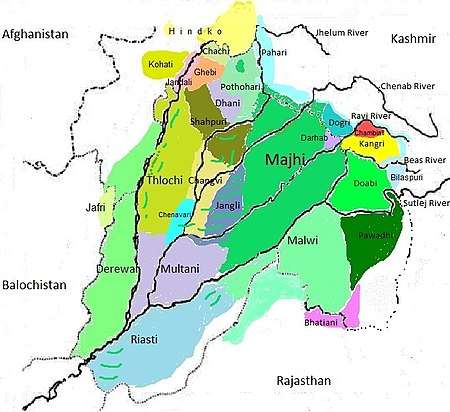Majhi dialect
| Majhi | |
|---|---|
| ماجھی, ਮਾਝੀ | |
| Native to | Pakistan, India |
| Region | Majha of central Punjab |
|
Shahmukhi Gurmukhī | |
| Language codes | |
| ISO 639-3 | – |
| Glottolog |
majh1252[1] |

Majhi (Punjabi: ماجھی; ਮਾਝੀ) is the standard dialect of Punjabi[2] and is spoken in the Majha region of the Punjab. The two most important cities in this area are Lahore and Amritsar.
| Part of a series on the |
| Punjabis |
|---|
 |
|
Asia
Europe North America |
|
Punjab portal |
Notable features
- Use of 'deya' (ਡਿਹਾ/ڈہیا) in continuous tenses:
| Majhi | Standard Written Punjabi |
| Oh karan deya si
ਉਹ ਕਰਨ ਡਿਹਾ ਸੀ وہ کرن ڈہیا سی |
Oh kar rehya si
ਉਹ ਕਰ ਰਿਹਾ ਸੀ اوہ کر رہیا سی |
| Oh karan dayi aye
ਉਹ ਕਰਨ ਡਹੀ ਏ اوہ کرن ڈئی اے |
Oh kar rahi hai
ਉਹ ਕਰ ਰਹੀ ਹੈ اوہ کر رہی اے |
- Alternate auxiliary verbs
'Han' (ਹਨ/ہن ) is never used in spoken Majhi, 'Ne' (ਨੇ/نے ) is used instead. E.g. Oh karday ne (ਉਹ ਕਰਦੇ ਨੇ / اوہ کردے نے)
First person singular 'aan' or 'waan' (ਆਂ, ਵਾਂ/ آں، واں) is used. E.g. Main karnaan, Main karna waan (ਮੈਂ ਕਰਨਾਂ, ਮੈਂ ਕਰਨਾ ਵਾਂ/ میں کرناں، میں کرنا واں)
Third person singular 've' or 'aye' (ਵੇ,ਏ / وے،اے) is used. E.g. Oh karda ve (ਉਹ ਕਰਦਾ ਵੇ / اوہ کردا وے)
- Sporadic use of na- verb ending instead of da- ending
| Majhi | Standard Written Punjabi |
| Main karnaan/ karna waan
ਮੈਂ ਕਰਨਾਂ/ ਕਰਨਾ ਵਾਂ میں کرناں/کرنا واں |
Main karda haan
ਮੈਂ ਕਰਦਾ ਹਾਂ میں کردا ہاں |
| Asi karnay aan/waan
ਅਸੀਂ ਕਰਨੇ ਆਂ/ਵਾਂ اسی کرنے آں/واں |
Asi karde haan
ਅਸੀਂ ਕਰਦੇ ਹਾਂ اسی کردے ہاں |
| Asi karniyaan waan
ਅਸੀਂ ਕਰਨੀਆਂ ਵਾਂ اسی کرنِیاں واں |
Asi kardiyaan haan
ਅਸੀਂ ਕਰਦੀਆਂ ਹਾਂ اسی کردِیاں ہاں |
| Tu karna ayein
ਤੂੰ ਕਰਨਾ ਏਂ توں کرنا ایں |
Tu karda hain
ਤੂੰ ਕਰਦਾ ਹੈਂ توں کردا ہیں |
| Tusi karniyaan o/wo
ਤੁਸੀਂ ਕਰਨੀਆਂ ਓ/ਵੋ تسی کرنِیاں او/وو |
Tusi kardiyaan ho
ਤੁਸੀਂ ਕਰਦੀਆਂ ਹੋ تسی کردِیاں ہو |
- Absent subject realised in auxiliary verb
ਕੀ ਕੀਤਾ ਈ کی کیتا ای : What have you (sing.) done?
ਕੀ ਕੀਤਾ ਜੇ کی کیتا جے: What have you (sing. formal or plu.) done?
ਕੀ ਕੀਤਾ ਸੂ کی کیتا سُو: What has he/she done?
ਕੀ ਕੀਤਾ ਨੇ کی کیتا نے: What have they done?
ਲੜਾਈ ਕੀਤੀ ਸਾਈ لڑائی کیتی ساای: You (sing.) made a fight.
ਲੜਾਈ ਕੀਤੀ ਸਾਜੇ لڑائی کیتی ساجے: You (sing. formal or plu.) made a fight
ਲੜਾਈ ਕੀਤੀ ਸਾਸੂ لڑائی کیتی ساسُو: He/She made a fight.
ਲੜਾਈ ਕੀਤੀ ਸਣੇ لڑائی کیتی سنے: They made a fight.
References
- ↑ Hammarström, Harald; Forkel, Robert; Haspelmath, Martin, eds. (2017). "Majhi (Panjabi)". Glottolog 3.0. Jena, Germany: Max Planck Institute for the Science of Human History.
- ↑ Grierson, George A. (1916). Linguistic Survey of India. Volume IX: Indo-Aryan family. Central group, Part 1, Specimens of western Hindi and Pañjābī. Calcutta: Office of the Superintendent of Government Printing, India. p. 609.